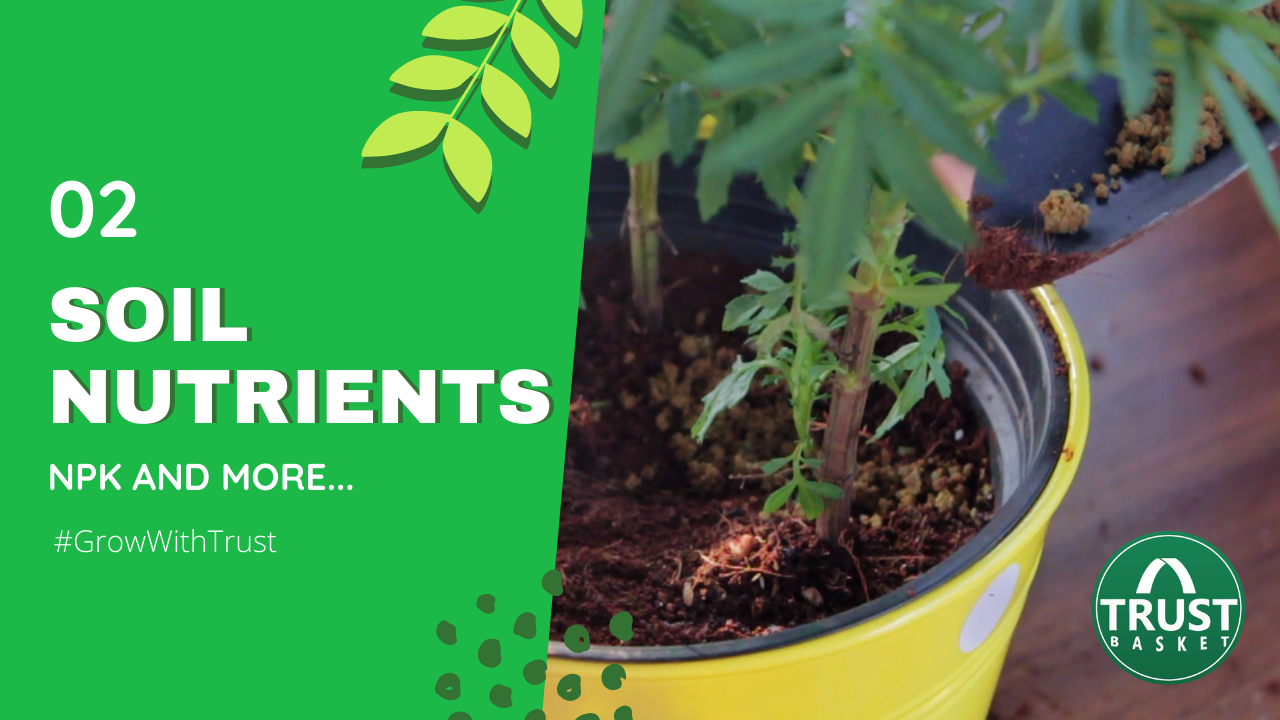How to Grow
How organic manure helps in increasing soil nutrients?
Every one of you wants your plant to grow well and bear a good number of fruits and flowers. The healthy growth and production of flowers and fruits mainly depend on plant nutrition. It depends on growing media, and type of fertilizers, provided all other growth factors are optimum.

When we experimented on the effect of chemical fertilizers and organic manure on plant growth. We got a great difference in the growth of the two plants. We selected two marigold plants of the same age and the same growth rate. We applied chemical fertilizer to plant 1 and organic manure to plant 2 and watered well and kept under sunlight. We let them grow for two months.


The result after two months:
After two months we observed that both plants were growing well. But the only difference was the number of flowers. For plant one we applied chemical fertilizers, but for plant 2 we applied organic manure.
| Sl. no | Elements | Plant one | Plant two |
| 01. | Fertilizer | Chemical | Organic manure |
| 02. | Growth of plant | Good | Good |
| 03. | Number of flowers | Comparatively less | More |
Reason for difference:
The main reason for the difference in flowering was the type of fertilizers we used. Chemical fertilizers provided only specific type of nutrients to plants like NPK, which means nitrogen, phosphorous, and potassium. But plants want all other nutrients to grow well and bear a good number of flowers and fruits. So plant 1 got only a few nutrients from chemical fertilizer and plant 2 absorbed most of the nutrients from vermicompost. Like human beings even plants need balanced nutrition for their healthy growth and survival. That's why the classification of nutrients based on the requirement of the plant becomes important.

Classification of nutrients:
Based on the requirement of plants, nutrients can be classified into three different groups, they are
1. Macronutrients
2. Micronutrients
3. Beneficial elements
Plant nutrition can be compared with the human diet. Plants want macronutrients in more quantity. So macronutrients can be compared with rice and chapatti, as we eat them in more amount plants also need them in more quantity. Examples of macronutrients are
- Nitrogen (N): it helps in vigorous vegetative growth of plants. And it is responsible for green lush color of the plant
- Phosphorous (P) : very much important in formation of sugars and starch in plants.
- Potassium (K): K is responsible for robust growth of plant and helps your plant to fight against pest and diseases.
- Calcium (Ca): Ca is a secondary nutrient. It takes an important role in the formation of cell wall and cell membrane
- Magnesium (Mg): important component of chlorophyll. Deficiency of Mg causes yellowing of leaves
- Sulfur (S): helps plants to fight against stress caused by pests. important for synthesis of oil in oil crops.

Plants also need micronutrients in small quantities. These nutrients can be compared with sweets. Because we like to eat sweets but in small quantity. Examples of micronutrients are
- Zinc ( Zn): Zn is important in formation of chlorophyll and helps plant to fight against stress caused by cold temperature
- Copper(Cu): Cu has very important role in photosynthesis and fighting against stress.
- Manganese: has role in photosynthesis process
- Boron: Bo has a very important role in reproductive growth stage of plants.

Beneficial elements can be compared with pickles and ghee. Because we can finish our food without these but still we want them for our better taste and satisfaction. In the same way, plants also want these beneficial elements for the production of better quality fruits and flowers. Beneficial elements increase resistance in plants against diseases and damage caused by insect pests, show robust growth.
Watch this video, where we explain plant nutrients in detail
Role of nutrients in the plant's life cycle:
Plants want all types of nutrients to complete their life cycle. The life cycle of a plant includes seed, germination, seedling stage, juvenile stage, and reproductive stage.
Different growth stages of plants:- Seed: seed is a matured ovule consisting of embryonic plant along with stored food. It is the basic material required to start planting.
- Seedling: small young and delicate plants grown out immediately from seeds.
- Juvenile stage: the stage of plant growth between seedling and reproductive stage.
- Reproductive stage: it is the flower and fruit initiation stage of plants. Here plants are able to bear good number of flowers and fruits.
A plant wants all these nutrients i.e. macronutrients, micronutrients, and beneficial elements to enter into all these stages and to complete its life cycle. That's why it is very important to provide all the nutrients for your plants to support their healthy growth.

Nutrients can be applied to plants in two different ways. One such way is providing nutrients through the application of chemical fertilizers. Another way is through the application of organic manures.
Disadvantages of chemical fertilizers:
Application of chemical fertilizers is easy but it provides only a few nutrients to your plants and they act like incomplete food for plants. Chemical fertilizers can be compared with protein powder or protein tablets which provide only protein for us but for better health and survival we want all other nutrients like carbohydrates, lipids, minerals, and vitamins. We get these nutrients by eating complete food like fruits, vegetables, meat, and milk. Therefore chemical fertilizers are not wholesome food that provides all the nutrients for plants.

One more drawback of applying chemical fertilizers to your plants is it will gradually kill all the beneficial microorganisms and makes your soil dead. Unknowingly if you apply chemical fertilizers in excess, it may harm your plant. Sometimes it will burn your plant. It is like when you take protein powder or tablet in excess it creates some side effects to you. In the same way, excess chemical fertilizers will have negative effects on the plant's development.
Advantages of organic manures over chemical fertilizer:
So instead of chemical fertilizers, another chemical free method is to go for organic manures. Because
- Organic manures act like complete food for plants and provide most of the nutrients as compared to chemical fertilizers.
- And will not make your soil toxic over a period of time.
- Helps to build up healthy microbes in the soil.
- Even if you apply organic manure in excess it will not harm your plants as chemicals. Plants will absorb how much they want and the remaining will be in the soil.
- Whenever they want nutrients, they will absorb from the soil sometimes nutrients will leach out from the soil if you over water your soil.

If you eat fruits and vegetables in excess they will not affect your health, except for some kind of uneasiness. Therefore the best way to provide most of the nutrients to your plants is by organic manures or vermicompost. Organic manures provide most of the nutrients if not all. So we recommend you ecofriendly and chemical-free fertilizers i.e. organic manures.
Difference between fertilizer and manure:
| Sl. no | Fertilizer | Manure |
| 01. | Fertilizer may be artificial or natural substance | Manure is natural substance |
| 02 | Obtained by synthesis of different chemicals | Obtained by plant and animal sources |
| 03 | Prepared in factories | Prepared in fields |
| 04 | Quick release of nutrients | Slow release of nutrients |
| 05 | Loss of nutrients through volatilization | No such loss of nutrients |
| 06 | Continues use makes soil toxic | It will improve soil texture, will not make soil toxic |
| 07 | It may kill healthy microbes present in soil | Manure supports growth of healthy microbes |
| 08 | Provides only few nutrients | Comparatively provides more number of nutrients |
| 09 | Price wise costly | Cheaper compare to chemical fertilizers |
| 10 | Fertilizers will not add humus to the soil | Manures add humus to the soil |
Preparation of organic manure ( Vermicompost) in the farm:
Organic manures in the farm is prepared in the same way as it is prepared in its natural habitat like a forest. The soil which is present in the forest will be having most of the nutrients that plants want to grow well. So on the farm, we will try to mimic the natural habitat of plants and produce wholesome food which is important for plants' growth and development.
Procedure
- For preparing vermicompost, either a plastic or a concrete tank can be used. The size of the tank depends upon the availability of raw materials like cow dung, straw, etc:
- Collect the biomass and place it under the sun for about 8-12 days. Now chop it to the required size using the cutter. Cutting biomass helps earthworms for faster conversion of waste into nutritious compost.
- Prepare a cow dung slurry and sprinkle it on the heap for quick decomposition. Which we kept under the sun.
- Add a layer (2 – 3 inches) of soil or sand at the bottom of the tank.
- Now prepare fine bedding by adding partially decomposed cow dung, dried leaves, and other biodegradable wastes collected from fields and kitchen. Distribute them evenly on the sand layer.
- Continue adding both the chopped bio-waste and partially decomposed cow dung layer-wise into the tank up to a depth of 0.5-1.0 ft.
- After adding all the bio-wastes, release the earthworm species over the mixture and cover the compost mixture with dry straw or gunny bags.
- Sprinkle water regularly to maintain the moisture content of the compost.
- Cover the tank with a thatch roof to prevent the entry of ants, lizards, mice, snakes, etc., and protect the compost from rainwater and direct sunshine.

Mixing of organic manure in the soil:
Before planting, mix some amount of manure in the soil to increase fertility status and nutrient availability in your soil. And the mixing of organic manure introduces millions of microorganisms into the soil and makes it alive.

Inorganic matter & ideal soil:
Inorganic matter of soil refers to all the nutrients present in the soil. Ideal and healthy soil is the one that contains both organic matter and a good amount of nutrients with the proper proportion of soil air and soil water.

When you think of starting gardening or planting a sapling make sure your soil contains organic matter like biowaste and nutrients, with proper drainage level. Because soil is the basic thing that makes all the difference in the growth of plants. So always choose fertile and well-draining soil that supports your plant growth.



